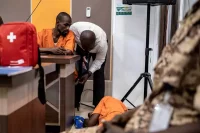
CAR: how Special Criminal Court appeal judges innovated and proposed a model
On July 20, 2023, the Appeals Chamber of the Special Criminal Court (SCC) in the Central African Republic handed down its first judgment on the merits. The ruling went largely unnoticed. However, it offers a real double added value: controlling the work of the trial chamber, and guiding the judges in their future task.
The Appeals Chamber was called to rule on the SCC trial court judgment handed down on October 31, 2022. Issa Sallet Adoum, Yaouba Ousman and Mahamat Tahir had been found guilty of crimes against humanity for murder and other inhumane acts, and war crimes for murder and outrages upon personal dignity, in particular humiliating and degrading treatment.… Seguir leyendo »











